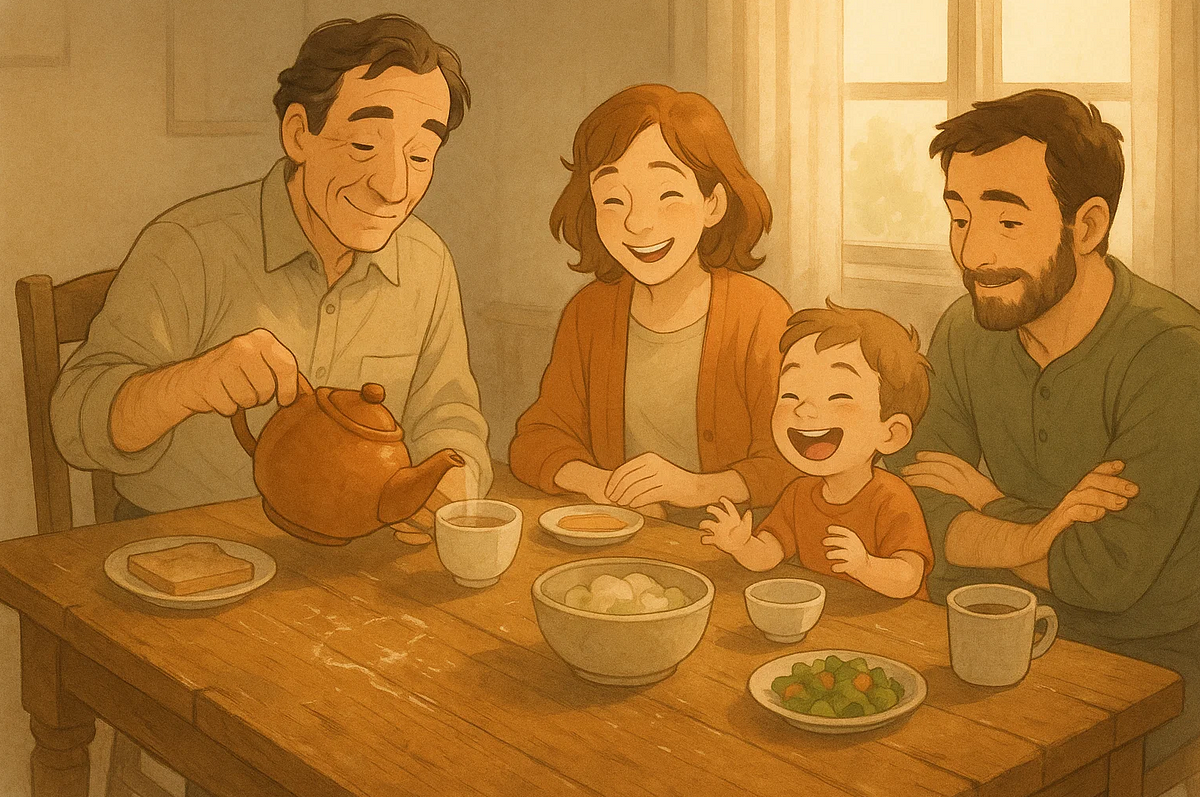The Wisdom of Imperfect Tables: Lessons from a Weekend with Uncle Ethan
--
I stared at the white mark on the polished wooden surface, my stomach dropping as I frantically dabbed at it with my napkin. The heat from the soup bowl had left its permanent signature on Uncle Ethan’s dining table. My wife’s eyes met mine with the same panicked expression. Uncle Ethan noticed, his weathered face crinkling into a smile. “You two can stop worrying about that,” he chuckled, reaching for the teapot. “You’re in good company. That table has collected quite a few stories over the years.” He pointed to another mark near the edge of the table. “See that one? I could fix it — just takes an hour with the right solution. But I decided to keep it.” His eyes twinkled as he poured the steaming tea. “The manufacturer made a beautiful table but forgot people would actually use it. Their mistake was making something perfect that couldn’t stay that way. My mistake would be chasing perfection at the expense of the people sitting around it.” *** Ten years had passed since I’d last seen Uncle Ethan at my wedding. Now, here we were, spending a long weekend at his home, our young children darting through hallways that echoed with the ghostly footsteps of his own children years before. I hadn’t expected philosophy with dessert, but that marked table became my first window into a man who had built his life around a simple truth: people matter more than things. *** “Come see this,” Uncle Ethan called the next morning, motioning me toward his office. Charts, schedules, and maps covered one wall, the organizational backbone of a trucking empire that had weathered economic storms that sank competitors. He ran his fingers over a framed photo on his desk — his youngest daughter sitting on his lap at his desk, maybe seven years old, beaming. “She filed my quarterly taxes last week,” he said, pride evident in his voice. “One afternoon. Used some computer tricks I’d never have figured out.” He picked up the frame, smiling at the memory captured inside it. “When she was little, she’d sit right here, pretending to help. Now she actually does. College next year. Business school.” He set the photo down gently. “She already knows more than I did at thirty.” “But that’s not what makes me proudest,” he continued, looking out the window where his daughter was helping my youngest tie his shoes. “Watch her with your daughter there. She’s always been the peacemaker. When her brothers fought, they’d come to her to settle things — not just fairly, but in a way that kept them both happy. During lockdown, she stayed online hours after school ended to help classmates who couldn’t figure out the technology.” His voice softened. “I see myself in her. Not the business part — that she got from her mother. The people part. That’s what matters.” *** Later that afternoon, I noticed Uncle Ethan watching his eldest son working meticulously on an intricate wooden piece in his workshop. The young man’s hands moved with precision over the fine details, his focus absolute. “He refuses my help,” Uncle Ethan confided, a complex mixture of frustration and admiration in his voice. “Works extra shifts at the school craft studio to fund his own materials and tools. Won’t touch a penny of what I’ve built.” “Does that bother you?” I asked. He considered this, watching his son’s methodical movements. “Sometimes. I built all this for them, after all.” He gestured vaguely at the expansive property. “But he’s determined to forge his own path.” The corner of his mouth turned upward. “Just like I did.” *** On our final evening, Aunt Flora brought out photo albums. As she turned pages filled with snapshots of trucking yards that grew larger with each decade, of children growing taller against the backdrop of expanding businesses, I noticed how Uncle Ethan’s gaze lingered not on the empire being built in the background, but on the faces in the foreground. “All of it,” he said, pointing to a photo of his first small fleet of trucks, “was always for them. The money, the business — just tools. Means to an end.” Flora reached for his hand, their fingers intertwining with the ease of decades. “I’ve kept a chair for him,” Uncle Ethan said suddenly, glancing toward the workshop where his eldest son still crafted his pieces. “In the company. But I hope when he comes back — and he will, someday — he’ll build something I couldn’t even imagine.” *** As we packed our car the next morning, I found myself looking at my own young children with new eyes. My daughter was carefully arranging her new presents in a backpack, delighted with the treasures Uncle Ethan and Aunt Flora had given her for the trip. I thought about that dining table with its collection of marks and memories. About a business built not as a monument but as a shelter. About children allowed to become themselves, not echoes. Uncle Ethan clapped a hand on my shoulder, breaking my reverie. “Next time,” he said, “don’t worry so much about the table.” But I knew he wasn’t talking about the table at all. Driving away, watching his figure grow smaller in the rearview mirror, I realized what I’d been given that weekend. More than hospitality. More than stories. I’d been given a blueprint — not for building a business, but for building a life that measures success by the happiness of those who share your table, imperfections and all.
